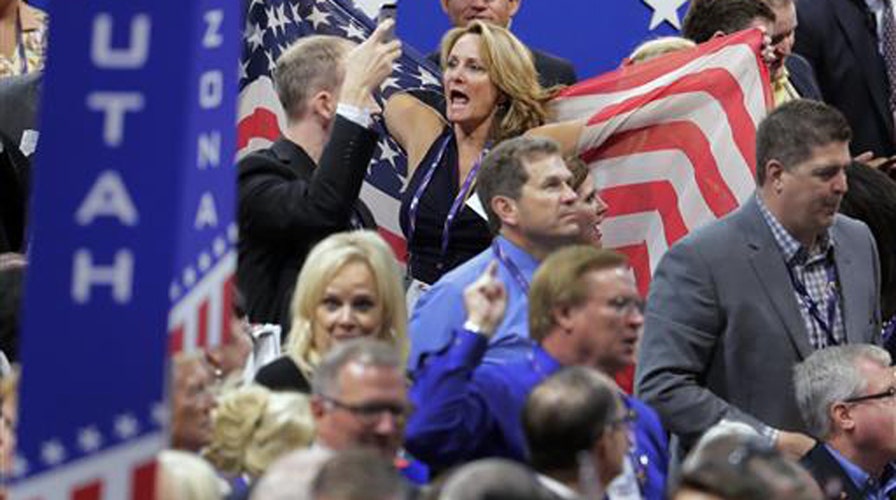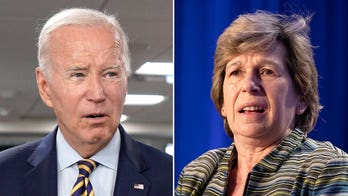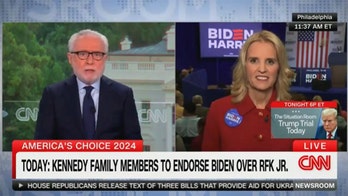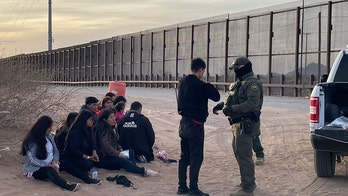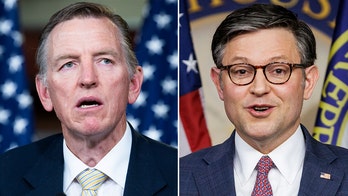RNC officials deny roll call vote over convention rules
Delegates chant 'shame'; James Rosen reports from the Republican National Convention
CLEVELAND – Republican officials hastily adopted a set of much-contested convention rules Monday, setting off an unruly protest from anti-Donald Trump delegates on the first day of the Republican National Convention in Cleveland.
Those anti-Trump forces had hoped to challenge the rules that bind delegates to vote for the presumptive GOP nominee, as part of a last-ditch bid to at least disrupt his march to the nomination. But the convention's presiding officer, Arkansas GOP Rep. Steve Womack, abruptly put the rules to a vote -- twice -- and declared them approved by voice.
This prompted loud objections from Trump opponents, who shouted “roll call vote" in a dramatic showdown that effectively ended the Never Trump movement, but also underscored the deep divisions that remain in the party even as the Trump campaign claims the GOP has united.
Those delegates were hoping for a state-by-state vote on the rules that bind delegates to back Trump.
“I have no idea what’s going on right now,” Utah Sen. Mike Lee said Monday, who helped lead the failed uprising. “This is surreal.”
Following the votes, almost all of the Colorado and half of Iowa delegations walked out. Former Virginia Attorney General Ken Cuccinelli and members of his state's delegation were screaming "shame" amid the vote; he later told CNN the RNC "violated its rules."
The Trump camp was said to be "livid" at the revived push.
"This is a big headache," one official told Fox News.
Anti-Trump delegates tried to force a vote after collecting signatures calling for one. They claimed to have more than enough support, including a majority of the delegates in nine states, to technically allow them to file a report challenging the convention rules.
But Womack said from the podium that delegates from three states withdrew their signatures. He then declared that the effort had fallen short.
The three delegations that dropped out of the effort to challenge the rules package were the District of Columbia, Minnesota and Maine. Alaska did not file the paperwork properly, while Iowa dropped out after the fact.
Womack took the unusual step of calling for two separate voice votes. He declared the pro-Trump delegates victorious both times despite the loud chorus of boos from the crowd.
Rory Cooper, senior adviser with the Never Trump group, blasted party officials, saying in a statement: “Delegates presented party officials with more than enough states to force a roll call vote on the floor. There is no excuse for strong arming delegates and skirting the rules to silence these members of the party.”
North Dakota delegate Gary Emineth, who had a role on the Trump Victory fundraising committee, resigned in protest following the floor fight over the way the anti-Trump forces were treated.
“They want a kumbaya moment. Why can’t we have a little drama?” he said. He also had strong words for RNC Chairman Reince Priebus; asked if Priebus should resign, he said “yes.”
The anti-Trump forces wanted to change a rule that requires delegates to vote for the candidate they were committed to by the primaries and caucuses. Under current party rules, Trump’s nomination is essentially secured since he’s accumulated more than the 1,237 delegates required to win.
While Trump wasn't in danger of losing the delegates he needs to get nominated, the stamina of the anti-Trump movement is an embarrassing setback for the presumptive nominee.
Paul Manafort, Trump’s campaign manager, downplayed the events Monday morning during a press briefing with reporters.
“We don’t expect anything to come out of the rules committee,” Manafort said.
At a separate event he said, “It’s not a movement. It’s some rogue, recalcitrant delegates.”
Other delegates had threatened to walk out if the rules weren't changed.
"We won't sit around and coronate a king," said Colorado delegate Kendal Unruh, who like many insurgents backed vanquished presidential contender Sen. Ted Cruz of Texas.
The convention's rules committee earlier had defeated the dissidents seeking to make the changes late last week, thanks to an alliance between the Trump campaign and RNC leaders on that panel. For a short time, it seemed to sideline the movement.
Manafort has said there is no longer a viable "stop Trump" movement, only some "malcontents" who don't represent the broader Republican Party.
Despite the tension, Manafort insists that the GOP is not showing signs of strain but instead is coming together in a show of party unity.
“Ninety-four to 95 percent have come together,” Manafort said.
Still, high profile Republicans have decided to skip the convention – as well as withhold their endorsement of the New York real estate mogul.
Former Presidents George H.W. Bush and George W. Bush said they would not attend the Cleveland convention – which seemed fine with Manafort.
“They are part of the past,” Manafort said. “We think that the unification is happening and we hope that when the Bush family decides to participate again in the political process, that they will join us. We would welcome them handily. We’ve reached out to them but healing takes time.”
Manafort called Ohio Gov. John Kasich’s decision not to speak at the event “a difficult situation.”
“It’s a difficult situation when the home state governor doesn’t participate in the convention process … We invited him. We wanted him to participate, he chose not to. We think that's the wrong decision. There were no conditions put on him.”
Aside from dealing with the rules package, delegates also approved the party platform during Monday’s afternoon session including language that Christian conservatives cheered as the most conservative statement of party principles in recent memory.
The GOP convention approved language reaffirming the party's opposition to gay marriage and bathroom choice for transgender people.
And new language condemning same-sex parenting says: "Children raised in a traditional two-parent household tend to be physically and emotionally healthier, less likely to sue drugs and alcohol, engage in crime or become pregnant outside of marriage."
FoxNews.com's Barnini Chakraborty and Fox News' Bret Baier and The Associated Press contributed to this report.
